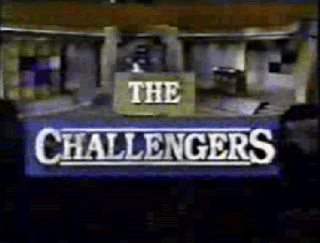Related Research Articles

Quiz bowl is a family of quiz-based competitions that test players on a wide variety of academic subjects. Standardized quiz bowl formats are played by primary school, middle school, high school, and university students throughout North America, Asia, Europe, Australia, and Africa.

Supermarket Sweep is an American television game show. Teams of contestants answer trivia questions before competing in a timed race to gather grocery items from the aisles of a supermarket. The original show was broadcast on ABC from December 20, 1965 to July 14, 1967. Later seasons aired on Lifetime from February 5, 1990 to June 16, 1995, and later on PAX from April 3, 2000 to May 23, 2003, with reruns airing until March 26, 2004. Another version of the show aired from October 18, 2020 to January 30, 2022, also on ABC.

Beat the Clock is an American television game show. Contestants attempted to complete challenges such as physical stunts within a time limit in order to win prizes. The show was a creation of Mark Goodson-Bill Todman Productions.

The National Science Bowl (NSB) is a high school and middle school science knowledge competition, using a quiz bowl format, held in the United States. A buzzer system similar to those seen on popular television game shows is used to signal an answer. The competition has been organized and sponsored by the United States Department of Energy since its inception in 1991.

Chain Reaction is an American television game show created by Bob Stewart, in which players compete to form chains composed of two-word phrases.

The Challengers is an American game show that aired in syndication during the 1990-91 television season The series was created by Ron Greenberg and was based largely on his 1969 production, The Who, What, or Where Game. Dick Clark presided over the show with Don Morrow announcing. The Challengers was a joint production of Ron Greenberg Productions and Dick Clark Productions, with Buena Vista Television as distributor.

Get the Picture is a children's game show that aired from March 18 to December 6, 1991, with repeats until March 13, 1993 on Nickelodeon. Hosted by Mike O'Malley, the show featured two teams answering questions and playing games for the opportunity to guess a hidden picture on a giant screen made up of 16 smaller screens. The show was recorded at Nickelodeon Studios in Universal Studios, Orlando, Florida. The program's theme music and game music was composed by Dan Vitco and Mark Schultz, and produced by Schultz. Its tagline is The Great Frame Game.

The Magnificent Marble Machine is an American television game show. Contestants partnered with celebrities to answer trivia questions and gain control of an oversized pinball machine. The program premiered on NBC on July 7, 1975 at 12:00 pm ET, replacing the short-lived game show Blank Check.

History IQ is a game show on the History Channel which premiered on October 2, 2000 and aired for two seasons. Marc Summers hosted and Harvey announced, reuniting the two from the Nickelodeon game show Double Dare. History IQ was produced by Glow in the Dark Productions.

Telly Addicts was a British television game show that aired on BBC One from 3 September 1985 to 29 July 1998, and hosted by Noel Edmonds. All questions were based on television programmes past and present, and generally took the form of a short clip being shown followed by a series of questions either specifically about the clip or more generally about the programme from which it had been taken. Two teams sat opposite each other on sofas. The final series in 1998 had three teams of two players.
Trivial Pursuit is an American game show that ran on The Family Channel from June 7, 1993 to December 30, 1994. Loosely based on the board game of the same name, it is hosted by Wink Martindale with Randy West announcing.

Headline Chasers is an American game show that ran daily in syndication from September 9, 1985, to May 23, 1986, with reruns airing until September 5. The series was hosted by Wink Martindale, who also created the series and was its executive producer, with Johnny Gilbert serving as announcer. It was produced by Wink Martindale Enterprises and Merv Griffin Enterprises with King World Productions, Griffin's partner for his other syndicated game show offerings, as distributor. Headline Chasers was recorded at TAV Celebrity Theater in Hollywood, the same studio which housed The Merv Griffin Show.

Blackout is an American game show that was broadcast on CBS as part of its daytime schedule from January 4, 1988 until April 1, 1988. The program was created and produced by Jay Wolpert. The game features two contestants, each paired with a celebrity. Contestants attempt to solve word puzzles consisting of a sentence or short paragraph with four blank spaces. Players guess each missing word based on hearing clues recorded by their partner, but with the playback being muted or "blacked out" at certain places by their opponent.
Trashed is a television game show that ran on MTV from February 14 to July 23, 1994, with Chris Hardwick as host.
PDQ and Baffle are American television game shows created by Heatter-Quigley Productions. Both shows' objective was for contestant/celebrity teams to guess a given word or phrase in the shortest amount of time with the fewest letters given as possible.

Supermarket Sweep is a British game show that is based on the original American version. Originally hosted by Dale Winton, it ran for exactly 8 years from 6 September 1993 to 6 September 2001 and then revived from 12 February to 31 August 2007 on ITV.

Three for the Money is an American game show produced by Stefan Hatos-Monty Hall Productions that aired on NBC from September 29 to November 28, 1975. Dick Enberg was the host with Jack Clark announcing. Enberg was also hosting Sports Challenge at the time and had just joined NBC's sports division.

Break the Bank is a game show created by Richard S. Kline. It aired in syndication from September 16, 1985 to June 20, 1986, with repeats airing until September 12. It was not related to two previous shows by the same name.
Rumor Has It is an American daily game show that aired on the cable channel VH1 from June 7 to October 28, 1993. Brian O'Connor was the host and John Ten Eyck announced.
One Hundred and Eighty is a British darts game show that aired on Sky 1 from 15 September to 22 October 2015 and was hosted by Davina McCall. Russ Bray served as onstage referee, while Freddie Flintoff and Rod Studd provided commentary from a backstage control booth.